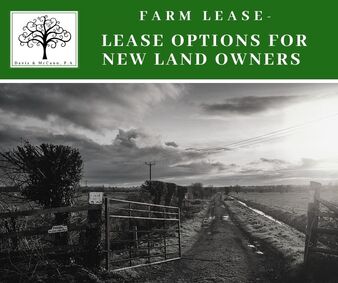 Are you a first-time owner of farmland in Kansas? Whether you have inherited the farmland or are an investor looking to diversify your assets, you need a plan to manage this new property as a revenue source. As a new land owner, if you have no interest in managing the farmland yourself, you can contact local or regional land management companies to help you with the management process. These companies specialize in locating area farmers to actively farm your land, negotiate lease terms, and essentially act as the landlord in your absence. This is a viable, stress-reduced option for some individuals, especially investors who may not depend on the annual revenue from the farmland. However, you will want to thoroughly understand what the management fees will cover and how much they will impact your profits. If you feel confident in your knowledge of the area where your property is located and are comfortable negotiating directly with farmers, you may want to handle your own lease agreement and landlord responsibilities. As the land owner, if you don’t want to come up with the cash for operating expenses or are unable to do so and prefer instead to just have a guaranteed income annually, it might be desirable to establish a cash lease with your farming tenant. The cash lease is a way to reduce your risk, while guaranteeing you receive a set income. You won’t be responsible for any of the tenant’s expenses related to the crop planting and harvest. The downside is that you will also not be entitled to any of the profits from the crop. A cash lease should be in writing and should include the names of the parties, term of the lease, the property description, the lease rate per acre, payment schedule, renewal terms (if any), and party signatures. We also recommend including a clause regarding workmanship (including noxious weed control), government payment splits (if any), land use, sublet provisions (if any), pasture use (if any) and specifications regarding any easements, minerals, or wind leases pre-existing on the property. There are additional provisions that should be included but may vary based on your individual circumstance, the type of farmland you own and its location. As an absentee land owner with a cash lease, you generally will not be considered to be in the business of farming for tax purposes. Check with your accountant to verify your tax situation prior to negotiating and signing a lease. If you are more comfortable with risk and want the chance to share in a larger profit from the crops grown on the land, you should consider using a crop share lease. A typical Kansas crop share lease holds the landlord responsible for 1/3 of all expenses on the crop and the tenant is responsible for the remaining 2/3 of expenses, however those ratios are negotiable. Expenses may include the cost of fertilizer, lime application, herbicides, etc. The crop yield is split in a similar manner, with the landlord and tenant receiving the same ratios of yield as they contribute to the expenses. The remaining lease provisions will be very similar to the cash lease. Again, additional provisions are necessary to include in a crop share lease agreement that protects you and your tenant, but your unique situation will influence what provisions will need to be included. Although you can receive a larger annual profit by utilizing a crop share lease, you will bear the risk of having a year(s) with complete crop failure and no income (in the absence of crop insurance). If you have questions about a Kansas farm lease, contact Davis & McCann, P.A., Dodge City, Kansas at 620-225-1674. We are members of Wealth Counsel, a national consortium of Estate Planning Attorneys and the National Academy of Elder Law Attorneys (NAELA). We focus our practice on providing clients with the best legal advice on Estate Planning, Medicaid and Long-term Care Planning, Special Needs Planning, Family Business/Small Business Succession Planning, Probate, Trust Administration, Real Estate, 1031 Exchanges, and related matters. Comments are closed.
|
NEWS YOU CAN USEDavis & McCann, P. A., Archives
April 2021
Categories
All
|

 RSS Feed
RSS Feed